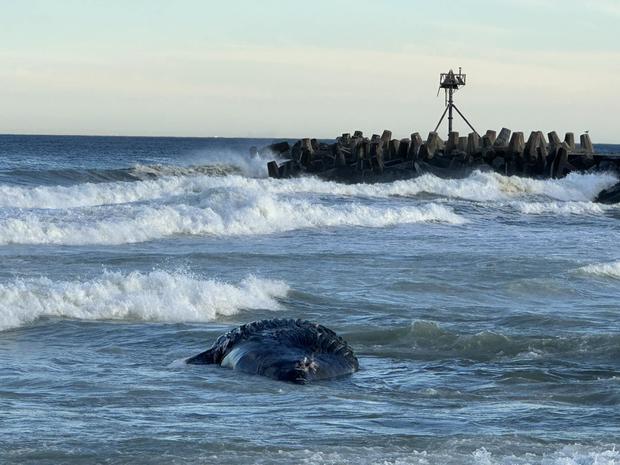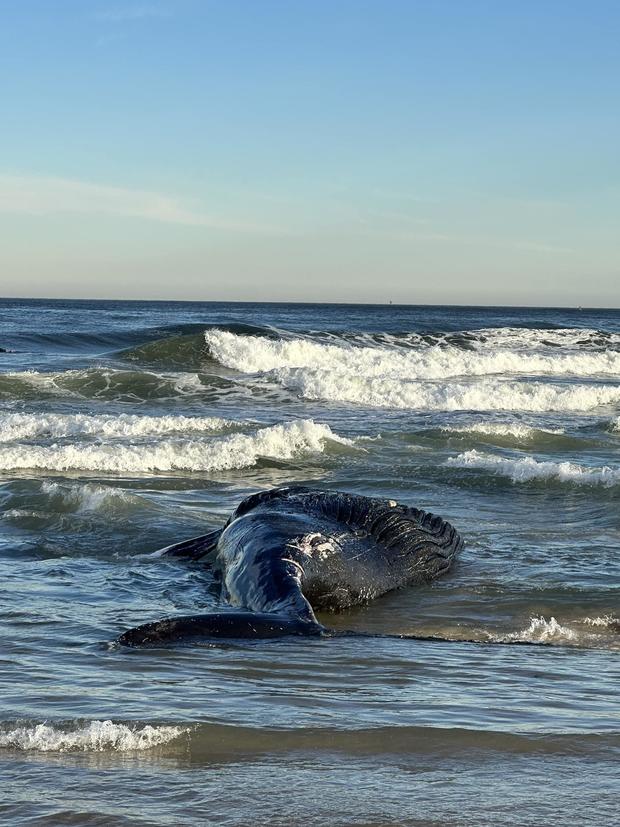Ninth whale death renews calls in New Jersey to halt offshore wind projects
A whale washed ashore in Manasquan, New Jersey, on Monday – the ninth whale found dead since early December on the New York-New Jersey shores – further stoking the debate about what’s causing the frequent mortalities along the Atlantic Coast.
“I’m currently standing on the beach a few hundred feet from the Manasquan Inlet watching yet another dead whale wash into the surf,” Point Pleasant Beach Mayor Paul Kanitra posted on Facebook on Monday. “Governor, when do these stop becoming coincidences? How many more will it take?”
Point Pleasant Beach Mayor Paul Kanitra via Facebook
What’s behind the whale mortalities has not been clearly established, but theories abound. Some local activists and officials blame offshore wind development in the region, claiming construction of the sites causes harm to marine animals. But federal officials have pushed back, saying that’s not what the evidence shows.
Kanitra was one of 12 New Jersey mayors who wrote a letter to New Jersey’s congressional delegation at the end of January demanding a moratorium on all offshore wind activities until “further investigation is held by federal and state agencies that determine these activities are not a contributing factor to recent whale deaths.”
There have been 10 humpback whale deaths in 2023, with six of those deaths occurring in the New Jersey-New York regions, according to Unusual Mortality Event statistics collected by NOAA Fisheries. Since the agency began collecting the data on Jan.1, 2016, there have been 183 deaths, with a majority of them occurring along the Eastern Seaboard in Massachusetts, New York, and overwhelmingly in New Jersey.
Some activists and officials say the deaths are linked to the rise of offshore wind projects that are part of the Biden administration’s goal of deploying 30 gigawatts of offshore wind energy by 2030, “enough to power 10 million homes with clean energy,” the administration says. In February 2022, six lease areas totaling over 488,000 acres were opened up through competitive bidding for wind energy development in the New York Bight oceanic region.
“The Biden administration and Governor Murphy continue to ignore the resounding calls for an investigation to address the historic surge of dead whales while offshore wind development ramps up off our beaches,” said New Jersey Rep. Chris Smith, a Republican, wrote in a statement on his website Tuesday.
There are currently four offshore wind projects in New Jersey, according to the government agency Bureau of Ocean Energy Management, which lists the projects on its website. In New York, there are three projects underway, according to the agency. These projects include surveys of the sea floor.
NOAA Fisheries has said that “there is no evidence to support speculation that noise resulting from wind development-related site characterization surveys could potentially cause mortality of whales, and no specific links between recent large whale mortalities and currently ongoing surveys.”
During a Jan. 18 conference call with journalists, experts convened by NOAA pushed back on the idea that the number of whale deaths was linked to offshore wind activities. Autopsies have been performed on more than half of the deceased whales, and about 40% of deaths have shown to be from either entanglement or vessel strike, said Sarah Wilkin, coordinator of NOAA’s Marine Mammal Health and Stranding Response Program.
“Those are human interactions that are potentially linked to the mortality of the animal causing them to be injured and die. The other animals have been inconclusive, and that’s for a large variety of reasons,” said Wilkin. “Generally, the state of decomposition plays a big role and it can make it hard for us to determine a definitive cause of death.”
Point Pleasant Beach Mayor Paul Kanitra via Facebook
For more latest Education News Click Here



